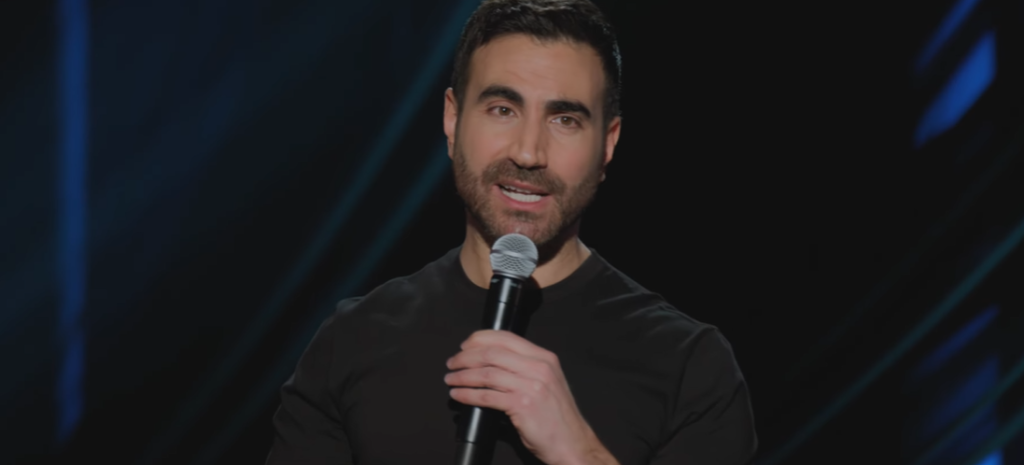No small, intensely personal moment in Brett Goldstein’s journey from British stand-up stages to Roy Kent’s Emmy-winning status seems more emotionally charged than his subdued homages to his parents. He surprised audiences in July 2022 with a cameo in Thor: Love and Thunder that he didn’t even tell his parents about, rather than a monologue or a stunt. They were understandably stunned when their son unexpectedly made an appearance as Hercules in the post-credits scene while they were watching the Marvel blockbuster. It wasn’t merely a surprise in the movie; it was a happy-go-lucky act of mischief that only a son who grew up in a laughing-filled home could accomplish.
Goldstein’s family dynamic is evidently the source of his emotional compass, which is especially evident in the way he strikes a balance between humor and vulnerability in his work. Although they have not received much attention, his parents, Howard and Vivienne Goldstein, continue to have an impact on his writing and performances. Growing up in a British-Jewish family in Sutton, South London, Brett’s upbringing was influenced by both cultural humor and keen emotional awareness. This combination, which is remarkably reminiscent of Ted Lasso’s tone, has enabled him to create characters that feel remarkably human in a genre that is frequently dominated by stereotypes.
Brett Goldstein – Personal and Career Snapshot
| Category | Details |
|---|---|
| Full Name | Brett Goldstein |
| Date of Birth | July 17, 1980 |
| Age | 44 (as of 2025) |
| Birthplace | Sutton, London, UK |
| Parents’ Names | Howard Goldstein (Father), Vivienne Goldstein (Mother) |
| Sibling | Tara Goldstein Carr (Sister) |
| Education | University of Warwick (Film & Feminism) |
| Notable Roles | Roy Kent (Ted Lasso), Hercules (Thor: Love and Thunder) |
| Writing/Production | Co-creator & writer of Shrinking |
| Net Worth (Estimated) | $5 million |
| Verified Source | People.com |
In a more recent and incredibly touching disclosure, Goldstein revealed that his own father, who suffers from Parkinson’s disease, served as the model for Harrison Ford’s character in the Apple TV+ series Shrinking. Brett called his father to get clarification after this information was made public—not by a press release, but rather by co-creator Bill Lawrence’s unintentional remark. “Are you telling everyone I’m Harrison Ford?” was the incredibly straightforward and charming response. “F—ing cool,” he added after a beat. Go for it.

That casual comment turned into a sort of thesis statement for Goldstein’s family’s approach to life, which is straightforward, funny, and infused with a dash of modest swagger. It’s not just cute; it’s educational. His family presents an unvarnished and genuine side of him in a field that is frequently characterized by performance. The emotional depth of Shrinking, which combines humorous timing with profound psychological themes, was significantly enhanced by that influence, which subtly shaped his decisions.
The kind of subtle humor Brett usually incorporates into his characters is reflected in his father’s wit and fortitude, particularly while dealing with Parkinson’s disease. It’s lived-in, weathered, occasionally rough, but always honest; it’s not slapstick. Instead of being a shield, the humor serves as a coping mechanism and a means of connection, which Brett has developed into something very creative. In many respects, the show’s ability to discuss terminal illness without offending viewers is a tribute to his father’s unwavering spirit.
Although his mother, Vivienne, has not been in the public eye, Brett has mentioned in previous interviews that she was instrumental in exposing him to traditional storytelling. His description of her conveys an incredibly strong emotional connection, fostered by common interests rather than showmanship. It’s simple to picture a young Brett and her watching classic movies together, taking in the subtleties of the story before he even knew what to call it.
Beyond merely narrative DNA, the impact of both parents appears to have directly influenced his interactions with fame. Brett has significantly cut back on the amount of self-promotion that is customary in his role, even with his Marvel roles and Emmy awards. He doesn’t exaggerate his character in interviews. Rather, he uses anecdotes, frequently involving his family, to firmly establish his public persona in an incredibly powerful way: sincerity.
Although there have always been many self-styled auteurs in the entertainment industry, few have adopted emotional transparency to the extent that Goldstein has. He will alternate between poetic vulnerability and a well-timed joke that contains profanity during interviews. This rhythm, which was developed at the family dinner table rather than in acting school, is especially helpful in building audience trust.
It’s difficult to teach Brett how to write characters that readers identify with, not just for. It’s frequently inherited or developed via lengthy discussions with people who valued honesty above all else but never cared about celebrity. In his instance, that would be Howard and Vivienne, two people who appear to be the masterminds behind his authenticity despite not being on the tabloid circuit.
Tara Goldstein Carr, his sister, also helps to provide this emotional support. Despite keeping a low profile, Brett’s conversations about identity, purpose, and storytelling reveal her influence in a subtle way. Their family’s privacy policy seems especially strong in a time when anything can become a popular hashtag.
Brett’s strategic playfulness was evident in the Marvel cameo, which he kept hidden from even his closest relatives. It wasn’t merely for amusement. It served as a reminder of how happiness turns into a memory when it is unexpectedly shared. A son giving his parents something that no red carpet could ever do: surprise, delight, and pride wrapped in five seconds of screen time—his parents’ response, captured only in anecdotes rather than videos, is still one of the purest examples of family and celebrity.

